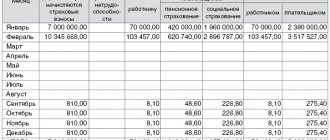The last salary changes were in 2016
From October 3, 2021, a new version of Article 136 of the Labor Code of the Russian Federation is in force (in connection with the entry into force of Federal Law No. 272-FZ dated June 3, 2016). In connection with this change, it makes sense for the accountant to immediately pay attention to how many consequences, namely:
- salaries cannot be paid later than the 15th day of the month of the next month (See “New deadlines for paying salaries in 2021: what has changed”);
- difficulties may arise in meeting the deadlines for paying bonuses for periods worked (See “Terms for paying bonuses under the new wage law: what has changed”);
- you will need to control the periods between the advance and the main salary (See “Salary and advance in 2021: how many days between payments”).
How to approve
The procedure for making mutual settlements is established for each institution individually. However, the current provisions must be enshrined in separate local acts. For example, fix the days when salaries will be given in the employment contract with the employee, in the collective agreement, in the internal labor regulations, in the wage regulations or in the accounting policy. Or issue a separate order or order.
IMPORTANT!
It is unacceptable to specify a period in the order, for example, “from the 5th to the 7th”. The day your salary arrives must have a specific meaning. Please indicate a specific date in your order. For example, the deadline for paying salaries for January 2021 is the 5th day of the month following the month of accrual, that is, February 5th.
Salary payment date 2021
According to the new version of Article 136 of the Labor Code of the Russian Federation, in force since October 3, “The specific date for the payment of wages is established by the internal labor regulations, a collective agreement or an employment contract.”
Thus, from October 3, the salary payment date must be specifically determined. Previously, there was no such requirement, so many employers set a salary payment period, for example, “from the 1st to the 12th” or, for example, from “the 5th to the 7th.” As of October 3, 2021, these types of pay periods are illegal.
The salary payment date from October 3, 2021 must be determined precisely and specifically. Otherwise, the company risks being fined up to 50,000 rubles for a primary violation and 100,000 rubles for a repeated violation (Article 5.27 of the Code of Administrative Offenses of the Russian Federation).
Pay your salary twice a month. Set specific payment dates in the employment or collective agreement or in the LNA, for example in the regulations on remuneration (Letter of the Ministry of Labor dated May 24, 2018 N 14-1/OOG-4375).
Pay the advance from the 16th to the last day of the current month, salary for the second half of the month - from the 1st to the 15th of the next month. If the payment date falls on a weekend or holiday, pay the salary the day before (Article 136 of the Labor Code of the Russian Federation, Letter of the Ministry of Labor dated February 14, 2017 N 14-1 / OOG-1293).
What documents indicate the days of payment of wages?
The employer is obliged to fix a specific schedule for the transfer of salary money in its local regulations (LNA): internal labor regulations (ILR), collective or labor agreement. It is these 3 documents that Art. 136 Labor Code of the Russian Federation.
The wording of this article is designed in such a way that the question often arises: is it necessary to fix salary terms in all of the above documents or is one of them sufficient? The answer to it was repeatedly given by both officials and judges (letter of Rostrud dated March 6, 2012 No. PG/1004-6-1, ruling of the Moscow City Court dated December 24, 2012 No. 4g/5-12211/12).
For information on what to include in an employment contract, read the article “Procedure for concluding an employment contract (nuances).”
According to the explanations, it is enough that the deadlines are fixed in one of those given in Art. 136 Labor Code of the Russian Federation documents. Moreover, according to Rostrud, PVTR is a priority. He explains this by saying that the PVTR is a general document, the norms of which apply to all personnel, while an employment contract regulates relations with a specific employee, and a collective agreement may not be concluded at all.
In order to completely eliminate disputes with inspectors, you can do the following: fix the rules for issuing wages in the PVTR, and add a phrase in labor or collective agreements that refers to the PVTR: “salaries are issued in accordance with clause (here we indicate the clause number of the PVTR) of the rules labor regulations..."
Want another expert opinion? Sign up for a free trial of ConsultantPlus or, if available, proceed to the Salary Guide.
Who needs to change payment dates in documents?
Some employers will not need to do anything if the salary payment dates meet the requirements of the new Article 136 of the Labor Code of the Russian Federation. However, it is necessary to change the salary payment dates if:
- employees receive their salary later than 15 days after the end of the period for which it was accrued (for example, for the second half of the month - on the 18th of the next month);
- salary is paid once a month;
- salaries are paid on days that are more than half a month apart, for example the 6th and 23rd;
- salaries are paid not on a specific day, but on one of the days of a fixed period, for example from the 5th to the 10th.
How exactly to proceed and change the salary payment dates? Follow the step-by-step instructions.
Legal basis
Despite the fact that the right to set a specific day on which salaries are paid to employees is reserved to the employer, officials have provided a number of key rules. Thus, in accordance with Article 136 of the Labor Code of the Russian Federation, the employer is obliged to:
- Make settlements with employees at least twice a month, every 15 calendar days.
- Pay wages for the first half of the month no later than the last day of the current month.
- Pay wages for the second part of the month no later than the 15th day of the next month.
IMPORTANT!
The employer has the right to set different deadlines for transferring payments for each structural unit of the organization. For example, if an institution has a complex structure (several structural units, departments, workshops), it employs a large number of full-time and freelance specialists. In this case, the employer can set different days for each department. However, deadlines cannot violate Art. 136 Labor Code of the Russian Federation.
How to determine the terms of advance payment and salary
As noted above, there are no strict deadlines for providing money to the employee. The administration of the enterprise is free to independently regulate the frequency and days of transfer of profits to employees. The main thing is to observe the following periods in practice:
- payment of money for the first two weeks of the current month occurs during the period from the 15th to the 31st;
- transfer of money for the second half of the previous month should be carried out between the 1st and 15th of the next month.
At the same time, we must not forget that the gap between different payment dates should be two weeks.
Just as it is prohibited by law to delay the transfer of money, it is also prohibited to deposit funds before the due date. Exception: the payment date falls on a weekend or public holiday. In this case, the income must be credited to the employee’s account the day before.
In general, the Labor Code guarantees participants in legal relations the right of free initiative when establishing working conditions, which is included in the content of the work contract. But in matters of wages, it will not be possible to deviate from these rules. This means that the employee cannot independently ask the manager to transfer money only once a month.
Also on the topic: The procedure for dismissing a materially responsible person at his own request
Payment procedure
Article 136 of the Labor Code of the Russian Federation does not contain instructions on the amount of the advance payment, which should be considered an advance payment. Therefore, the procedure for calculating and determining the amount must be developed by the employer.
The total amount is reflected in writing in the employment contract. But it would be smarter to determine phased payments. In this case, you can write in the documentation that the first payment will be 35% of the amount of earnings. The second payment will be made in the amount of 65% of the full salary.
These actions are necessary for the employee. They will help determine the amount that the employee can count on at each stage of payments.
It is worth remembering that 35% was given as an example. The employer can determine for himself how much he will pay for labor for each half-month worked.
Payments earlier or later
According to current legislation, the employer does not have the right to pay remuneration for labor ahead of schedule. Otherwise, an administrative penalty will be imposed on the employer. However, officials have identified a number of situations when the transfer day may be earlier than approved. These include:
- Dismissal of an employee. Pay wages and all due compensation on the resigning specialist’s last working day. The details of the calculation are in the article “What payments are due upon dismissal in 2021.”
- The payment day fell on a non-working day. For example, the date fell on a weekend or holiday. In this case, the employer must complete the transfer on the last working day before the approved deadline.
- Vacation pay. Pay vacation money no later than three days before the employee starts his vacation. For example, if the vacation begins on July 27, 2018, then vacation pay will have to be transferred before July 24, regardless of the date or date of the salary.
In other cases, paying wages to employees earlier than the approved dates is highly not recommended. Despite the fact that the Supreme Courts have a positive attitude towards this situation, representatives of the labor inspectorate have the right to issue a fine if the payment time violates the “15 days” condition. Penalty for transferring ahead of schedule: for managers and individual entrepreneurs - 1000–5000 rubles. For a legal entity - up to 30,000 rubles.
Delaying payments is also not recommended. For such violations, large fines are provided under Art. 5.27 Code of Administrative Offences. In addition to the administrative penalty, the employer must assess and pay special compensation. Read more: “Compensation for delayed wages: calculation features.”
Salary payment periods according to the labor code
The frequency of salary transfers is established by Article 136 of the Labor Code of the Russian Federation, which provides for the maximum period for paying money to each employee of the enterprise. Violation of established requirements entails the application of legal liability measures. In addition to disciplinary action, administrative or criminal liability, the employer will also have to pay the person a penalty for each day of delay in addition to the official profit.
Also on the topic: The Basics of Legislation on Notaries clarifies the composition of legal and technical services
The list of employer obligations in this area includes:
- depositing money into the employee’s account twice during the month (the first transfer is an advance, and the second is wages);
- part of the amount must be provided no later than the fifteenth day of each month;
- the limit difference between the advance date and the day of the main profit is 15 days;
- strict compliance with the terms of the employment agreement, as well as local regulations in matters relating to the calculation of monetary remuneration to employees.
The law allows you to set different periods for transferring money to individual positions of employees. But this must be documented, and it is also necessary to comply with time restrictions in the area of transferring money to employees.
Determining different dates for issuing money is legal and does not violate the rights of employees. Therefore, it will not be possible to appeal the management’s decision. This right operates to protect the work of entrepreneurs.
In what case will the weekend be paid?
Another rule for paying salaries in 2021 concerns holidays. It directly affects the income of workers, since the employer is now obliged to provide paid days off required for medical examination. The modified Article 185 of the Labor Code of the Russian Federation now obliges enterprises to allocate paid days:
- twice a year - for working pensioners and people who have less than 5 years left before their well-deserved rest;
- once every 3 years - to all other employees.
To receive such a day off, the employee must write an application, agree on the date of absence from the workplace with the boss, and submit a certificate of medical examination to the accounting department. In the timesheet, this day will be reflected according to the average number of hours, and according to this, the salary will be calculated.
Attention! Within our portal, you can get advice from a corporate lawyer completely free of charge. Ask your question in the form below!
What responsibility does an employer bear if wages are not paid on time?
For violation of the terms of payment of wages to employees, the employer faces administrative and financial liability. In the first case, he will be responsible to the state, in accordance with the Administrative Code.
According to Article 5.27 of the Code of Administrative Offenses of the Russian Federation, namely its paragraph 1, for a primary violation an organization may be punished in the form of:
- warnings;
- a fine of 1 to 5 thousand rubles for responsible persons or individual entrepreneurs;
- fine from 30 to 50 thousand for legal entities.
In case of repeated violation, the punishment is imposed in accordance with paragraph 2 of Article 5.27 of the Code of Administrative Offenses:
- disqualification for a period of 1 to 3 years;
- a fine of 10 to 20 thousand rubles to an official or individual entrepreneur;
- fine from 50 to 70 thousand for a legal entity.
Moreover, in addition to the administrative penalty, which is collected in favor of the state, the employer bears financial liability to its employees. In accordance with the Labor Code of the Russian Federation, for each day of delay, the employee must pay 1/150 of the key rate of the Central Bank of the Russian Federation in 2021 of the amount withheld. The compensation is issued along with the salary; no application from the employee is required to receive it.







